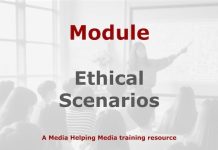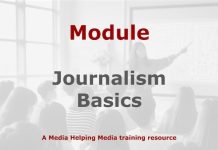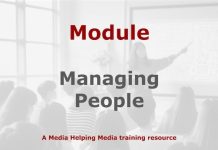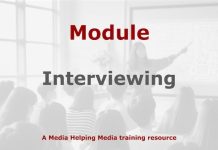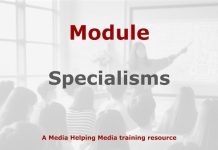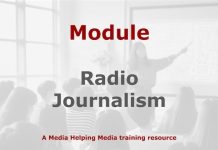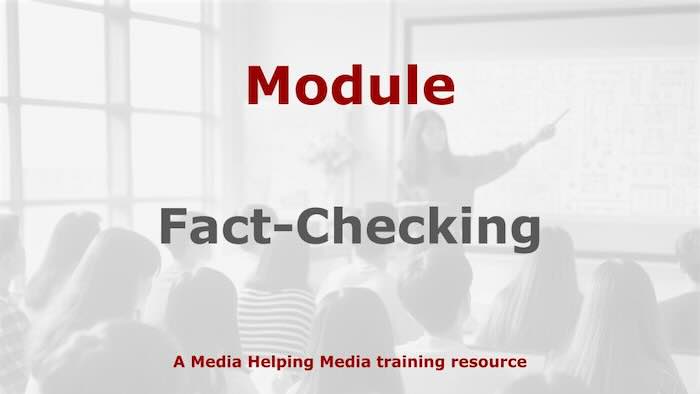 This free educational module provides an outline for a six-week course teaching students about fact-checking in a world of information disorder.
This free educational module provides an outline for a six-week course teaching students about fact-checking in a world of information disorder.
It’s designed to be adapted by college and university lecturers to address local teaching requirements.
The module equips journalism students with the critical skills necessary to navigate the complex information landscape, focusing on fact-checking, identifying misinformation and disinformation, and understanding the ethical implications of reporting in the digital age.
Students will learn to verify sources, analyse data, recognise algorithmic bias, and apply systems thinking to build robust fact-checking processes.
The six-week module provides a structured approach to learning the intricacies of fact-checking and combating information disorder.
Fact-checking and combating information disorder
- Target audience: Aspiring and practicing journalists
- Duration: 6 Weeks
- Methodology: Blended Learning (combining self-study of provided resources with suggested practical exercises and discussions)
Module aims:
- To give students an understanding of the critical importance of fact-checking in modern journalism.
- To equip participants with practical skills and strategies for identifying, verifying, and debunking false information.
- To develop an in-depth awareness of the various forms and mechanisms of misinformation and disinformation.
- To foster critical thinking and responsible reporting practices in an increasingly complex information landscape.
- To empower journalists to become proactive agents in building trust and combating information disorder.
Teaching methodology:
This module adopts a practical, hands-on, and inquiry-based learning approach. It encourages active participation, critical analysis, and the application of theoretical knowledge to real-world scenarios. Each week will involve:
- Directed self-study: Participants will engage with the provided online resources before scheduled sessions.
- Discussion and Q&A: Facilitated discussions to clarify concepts, share insights, and address challenges.
- Practical exercises/workshops: Application of learned techniques through case studies, simulations, and real-time verification tasks.
- Peer learning: Encouraging participants to share their experiences and learn from one another.
- Reflective practice: Promoting self-assessment and continuous improvement in fact-checking abilities.
Module timetable
Week 1: The foundations of fact-checking
- Core concepts: Understanding the ethical imperative of accuracy, the role of fact-checking in maintaining journalistic integrity, and the fundamental steps in verifying information.
- Learning objectives:
- Appreciate the significance of accurate reporting in a democratic society.
- Understand the basic principles and techniques of fact-checking.
- Begin to develop a critical mindset towards information encountered.
- Resources for self-study (Prior to week 1 session):
- Fact-checking and adding context: https://mediahelpingmedia.org/basics/fact-checking-and-adding-context/
- Lesson: Fact-checking and adding context: https://mediahelpingmedia.org/lessons/lesson-fact-checking-and-adding-context/
- Suggested activities/discussion points:
- Why is fact-checking more important now than ever before?
- Discussion of recent news stories where fact-checking played a crucial role.
- Brainstorming common errors that can occur without rigorous fact-checking.
- Initial practical exercise: Verifying a few simple claims using readily available information.
Week 2: Sharpening the fact-checking eye
- Core concepts: Moving beyond surface-level checks, exploring deeper investigative techniques, and understanding the concept of ‘trust chains’ in information dissemination.
- Learning objectives:
- Develop advanced fact-checking skills to tackle more complex claims.
- Understand the importance of tracing information back to its original source.
- Recognise the concept of ‘trust chains’ and how they can be compromised.
- Resources for self-study (Prior to week 2 session):
- Beyond basic fact-checking: https://mediahelpingmedia.org/advanced/beyond-basic-fact-checking/
- Lesson: Beyond basic fact-checking: https://mediahelpingmedia.org/lessons/lesson-beyond-basic-fact-checking/
- Fake news and trust chains: https://mediahelpingmedia.org/advanced/fake-news-and-trust-chains/
- Lesson: Fake news and trust chains: https://mediahelpingmedia.org/lessons/lesson-fake-news-and-trust-chains/
- Suggested activities/discussion points:
- Case study: analysis of a story that required extensive fact-checking.
- Workshop: on tracing information through social media and other online platforms.
- Discussion: How can journalists establish and maintain strong trust chains in their own work?
- Practical exercise: Deconstructing a seemingly complex claim, identifying sources, and verifying information from multiple angles.
Week 3: The SIFT method and lateral reading – powerful verification tools
- Core concepts: Introduction to the SIFT method for rapid fact-checking and the power of lateral reading as an efficient verification strategy.
- Learning objectives:
- Master the four steps of the SIFT method for efficient fact-checking.
- Understand and apply the principle of lateral reading to assess online sources.
- Improve speed and accuracy in verifying information.
- Resources for self-study (prior to week 3 session):
- SIFT for fact-checking: https://mediahelpingmedia.org/basics/sift-for-fact-checking/
- Lateral reading: https://mediahelpingmedia.org/basics/lateral-reading/
- Suggested activities/discussion points:
- Interactive workshop: Applying SIFT to various online claims (e.g., social media posts, news articles).
- Demonstration and practice of lateral reading techniques with diverse websites.
- Discussion: When is SIFT most effective? What are its limitations?
- Group activity: Participants work in pairs to fact-check several claims using SIFT and lateral reading, then present their findings.
Week 4: Navigating the information disorder landscape
- Core concepts: Defining and differentiating between misinformation, disinformation, and malinformation. Exploring the various forms information disorder can take and mapping its landscape.
- Learning objectives:
- Clearly distinguish between misinformation, disinformation, and malinformation.
- Identify and categorise different forms of information disorder (for example: satire, misleading content, fabricated content).
- Understand the broader ecosystem of information disorder and its impact.
- Resources for self-study (prior to week 4 session):
- The glossary of Information disorder: https://mediahelpingmedia.org/advanced/information-disorder-the-essential-glossary/
- Disinformation and misinformation: https://mediahelpingmedia.org/advanced/dealing-with-disinformation-and-misinformation/
- Forms of information disorder: https://mediahelpingmedia.org/advanced/information-disorder-how-to-recognise-the-forms/
- Information disorder – mapping the landscape: https://mediahelpingmedia.org/advanced/information-disorder-mapping-the-landscape/
- Suggested activities/discussion points:
- Debate: Is all “fake news” the same? Why is it important to differentiate between misinformation and disinformation?
- Analysis of real-world examples of different forms of information disorder.
- Mapping exercise: Participants identify key actors and pathways in the spread of information disorder within a specific context.
- Guest speaker (if possible): A researcher or expert on information disorder.
Week 5: Tackling fake news and rumours head-on
- Core concepts: Practical strategies for identifying and dealing with fake news. Understanding the psychology behind rumour spread and effective methods for countering it.
- Learning objectives:
- Develop a robust toolkit for identifying and debunking fake news.
- Understand the dynamics of rumour propagation.
- Learn effective communication strategies for correcting false information without amplifying it.
- Resources for self-study (prior to week 5 session):
- Dealing with fake news: https://mediahelpingmedia.org/advanced/how-to-identify-and-deal-with-fake-news/
- Snacking on rumour, feeding on facts: https://mediahelpingmedia.org/advanced/snacking-on-rumour-feeding-on-facts/
- Suggested activities/discussion points:
- Role-playing: Simulating scenarios where journalists encounter fake news or active rumours and practice their response.
- Workshop: Analysing the characteristics of common fake news narratives and visual cues.
- Discussion: The ethical considerations of reporting on or debunking fake news. How can journalists avoid giving oxygen to falsehoods?
- Case studies of successful and unsuccessful attempts to counter misinformation.
Week 6: Building a resilient fact-checking system and future challenges
- Core concepts: Designing and implementing effective fact-checking systems within news organisations. Discussing the ongoing evolution of information disorder and the journalist’s continuing role.
- Learning objectives:
- Understand the components of a strong fact-checking system.
- Develop strategies for integrating fact-checking throughout the news production process.
- Reflect on the future challenges of information disorder and the evolving role of the journalist.
- Consolidate learning and prepare for ongoing professional development in fact-checking.
- Resources for self-study (prior to week 6 session):
- Creating a strong fact-checking system: https://mediahelpingmedia.org/advanced/creating-a-strong-fact-checking-system/
- Suggested activities/discussion points:
- Group project: Participants design a hypothetical fact-checking system for a news outlet, outlining its structure, processes, and tools.
- Open forum: What are the biggest challenges facing journalists in the fight against information disorder today and in the future?
- Discussion: The role of technology (AI, algorithms) in both spreading and combating misinformation.
- Module wrap-up and Q&A: Addressing any remaining questions and providing resources for continuous learning.
- Reflective essay/presentation: Participants present their personal learning journey throughout the module and how they plan to apply their new skills.
Summary
This module provides a comprehensive framework for training journalists in the vital skills of fact-checking and combating information disorder. By combining theoretical knowledge with practical application and fostering a critical, proactive mindset, it aims to equip participants to uphold journalistic integrity in a challenging information environment.
